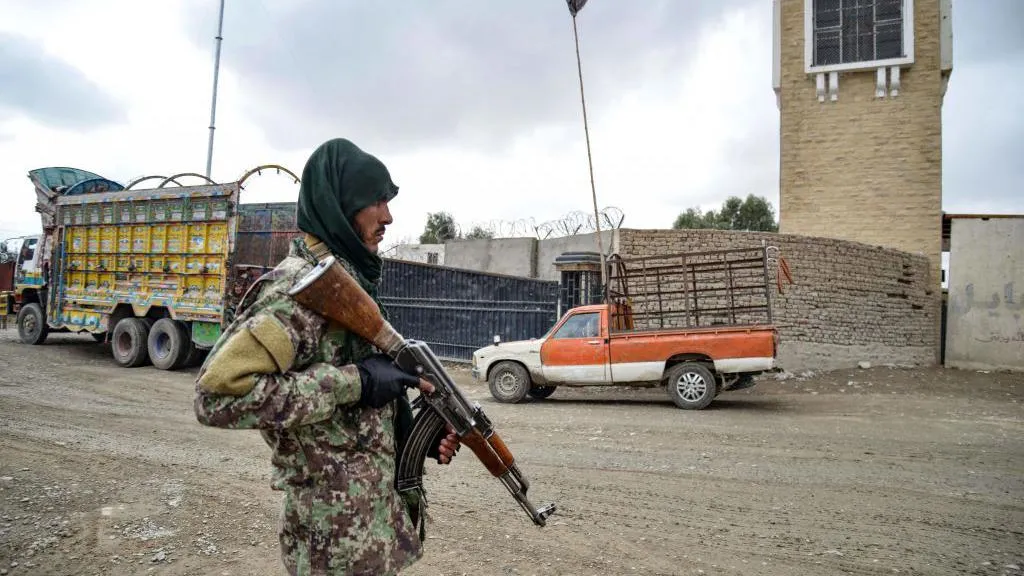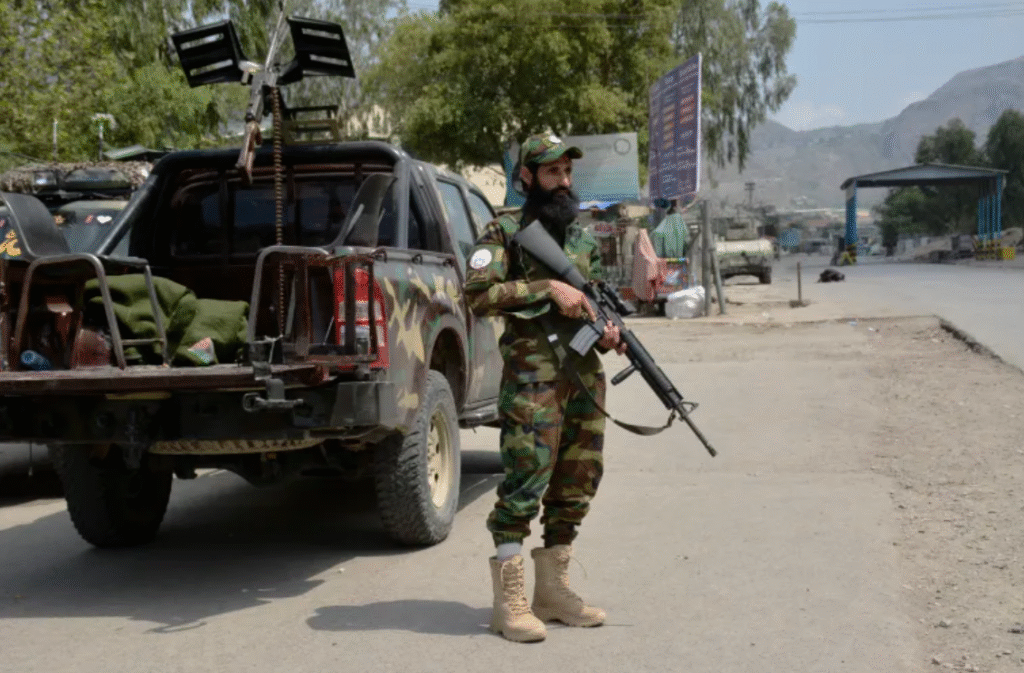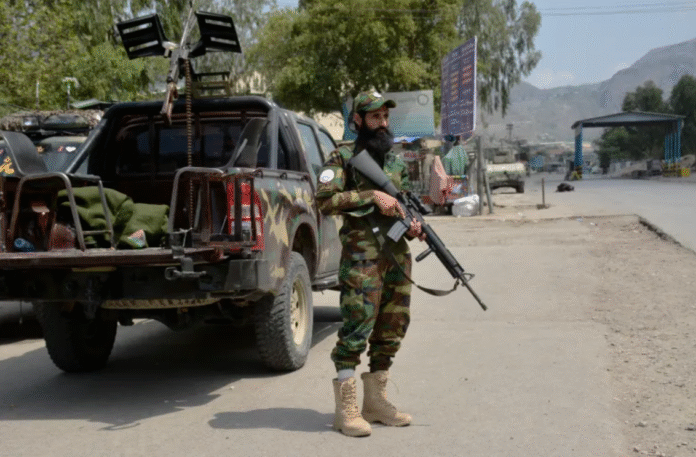Afghan Taliban Border Attacks Confirmed as “Retaliation,” Islamabad Warns Strong Response
Afghan Taliban border attacks have sparked a new wave of tension between Kabul and Islamabad after the Taliban government confirmed it launched what it called “retaliatory operations” against Pakistani forces along the northern border.
The fierce exchanges, which occurred in the rugged Kunar-Kurram mountain region, have reignited long-standing hostility between the two neighbours. The Taliban claimed the attacks came in response to Pakistan’s alleged airstrike inside Afghan territory, which reportedly hit a civilian market last Thursday.
Pakistan, however, insists the strikes were “unprovoked aggression” by Afghan forces and has vowed to respond with equal or greater force.

Pakistan Condemns the Afghan Taliban Border Attacks
In a strongly worded statement, Interior Minister Mohsin Naqvi denounced the Afghan Taliban border attacks, describing them as a “blatant violation of international law” and an act of aggression targeting civilians.
“Afghanistan is playing a game of fire and blood,” Naqvi wrote on X (formerly Twitter), warning that Pakistan’s military would respond “with a stone for every brick.”
The minister added that Pakistan reserves the right to defend its citizens and territory from any external threats.
A Pakistani military spokesperson also stated that the army would take “necessary measures to safeguard Pakistani lives and property.”
Gunfire and Artillery Reported Across Multiple Border Points
Security officials confirmed that heavy cross-border shelling and gunfire took place across several locations, including Angoor Adda, Bajaur, Kurram, Dir, Chitral, and Baramcha.
A police officer stationed near the Zero Point checkpoint in Kurram District told the BBC that intense firing from the Afghan side began around 10 p.m. local time (17:00 GMT).
Witnesses in nearby villages described the night sky glowing with artillery flashes and explosions echoing through the valleys. Casualties are still being assessed, but local reports suggest both military and civilian losses on each side.
Taliban Accuses Pakistan of Bombing a Civilian Market
The Afghan Defence Ministry accused Pakistan of carrying out airstrikes inside Afghanistan, claiming bombs were dropped on a civilian market in Paktika Province, destroying several shops and injuring multiple people.
According to eyewitnesses interviewed by BBC’s Afghan Service, the blasts caused chaos among locals, forcing families to flee the area.
Kabul labelled the Pakistani attack a violation of its sovereignty, escalating tensions that have been simmering since the Taliban regained power in 2021.
Pakistan Points Fingers at Afghan-Based Militants
Pakistan’s security officials maintain that Afghanistan is sheltering militants from the Tehrik-i-Taliban Pakistan (TTP), a group responsible for multiple deadly attacks inside Pakistan.
A top Pakistani general told local media that Afghanistan had become a “base of operations for terrorism against Pakistan.”
Islamabad has long accused the Afghan Taliban of turning a blind eye to TTP militants using Afghan soil to wage attacks aimed at imposing a strict Islamic rule in Pakistan.
The Taliban government in Kabul has denied all such allegations, insisting it does not allow any group to use its land to attack another nation.
Diplomatic Fallout Amid Growing Regional Tensions
The Afghan Taliban border attacks come at a sensitive time, coinciding with Afghan Foreign Minister Amir Khan Muttaqi’s week-long visit to India, his first since the Taliban’s return to power.
During the visit, India announced plans to reopen its embassy in Kabul, marking a cautious diplomatic thaw between the two countries after four years of closure.
However, the timing of the border escalation has complicated regional dynamics, with analysts suggesting it could derail emerging diplomatic efforts.
Pakistan’s Interior Minister Naqvi warned that Afghanistan would face consequences similar to India if it continued to provoke Pakistan militarily.
“Afghanistan will also be given a befitting reply so that it will not dare to look at Pakistan with a malicious eye again,” Naqvi stated.
Saudi Arabia and Qatar Urge Restraint
The rising hostilities have alarmed regional allies and international mediators.
Saudi Arabia, which recently signed a mutual defence pact with Pakistan, urged both nations to exercise restraint and avoid escalation. Riyadh emphasized that dialogue remains the only viable path to long-term stability in the region.
Meanwhile, Qatar, one of the key diplomatic players in Taliban-related negotiations, also expressed concern over the conflict, calling for both sides to “prioritise dialogue, diplomacy, and restraint.”
Global observers fear that continued hostilities between the two neighbours could destabilize an already fragile region that is still recovering from decades of war and political unrest.
Border Tensions and Regional Security Implications
Experts warn that if the Afghan Taliban border attacks continue, Pakistan may intensify its military operations along the frontier, potentially triggering a prolonged conflict.
The Kunar-Kurram region, already a hotspot for insurgent activity, has seen intermittent clashes since the Taliban’s takeover in 2021. The area’s rugged terrain makes it difficult to monitor, allowing militants to cross back and forth easily.
Analysts note that with both sides trading accusations and airstrikes, diplomatic channels between Kabul and Islamabad are rapidly deteriorating.
International Reactions: A Call for Peace
Several nations have voiced concern over the Afghan Taliban border attacks and the possibility of escalation.
The United Nations has urged both countries to maintain open communication and prioritize humanitarian protection in affected regions. Aid organizations have also called for safe passage for civilians trapped near conflict zones.
According to political experts, a sustained conflict could derail efforts to stabilize Afghanistan’s economy and weaken Pakistan’s internal security situation.

The Long Shadow of Terrorism and Trust Deficit
The Afghan Taliban border attacks highlight a deeper issue, the persistent trust deficit between Kabul and Islamabad. For decades, both sides have blamed each other for terrorism, cross-border raids, and political interference.
The Taliban’s claim of retaliation underscores its attempt to assert sovereignty, while Pakistan’s warning of “proportionate response” signals that neither side is willing to back down easily.
Unless regional diplomacy intensifies, this standoff could spiral into a new chapter of conflict in South Asia.
Conclusion
The Afghan Taliban border attacks have reignited a dangerous feud that could reshape the regional power balance. As Pakistan vows a strong response and Afghanistan defends its sovereignty, the international community watches closely, urging restraint, dialogue, and peace.
With mounting global pressure, both nations stand at a crossroads: escalate the fight or seize a rare chance to de-escalate for stability in the region.

